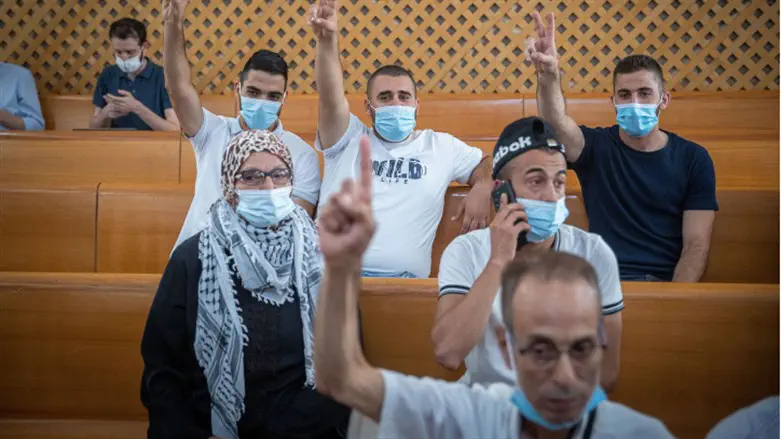
As the grandfather of Netanel, a 16-year old boy with Down Syndrome, I have to ask, what do Israel’s critics have against disabled children?
That’s not a rhetorical question. It’s legitimate to ask about recent actions by Arab advocates and their supporters which could adversely affect both Arab and Jewish children who have physical or mental disabilities.
In recent days, Israeli construction crews prepared to begin building a school for special needs children in the Sheikh Jarrah / Shimon HaTzadik neighborhood in Jerusalem.
The school’s students will be overwhelmingly Arabs, since the neighborhood’s children are overwhelmingly Arabs. That’s because of the ethnic cleansing campaign which Arab extremists undertook against their Jewish neighbors in the 1940s.
Who has been standing in the way of building the school? A handful of illegal Arab squatters. The Israeli police moved them out and dismantled the illegal structures that they had set up on the site. It was a routine, court-ordered enforcement of municipal law. Yet Israel’s critics erupted in fury.
J Street called the arrest of the squatters “incendiary and harmful.” Not harmful to the disabled Arab children, of course; harmful to the law-breakers. That’s who J Street chose to side with.
Offering a justification-in-advance for any upcoming Palestinian Arab terrorism, J Street announced that these preparations for building the school have “the potential to spark a violent escalation not only in Jerusalem itself, but across Israel and the occupied Palestinian territory.”
Which means that the next Arab who stabs a Jew, anywhere in Israel, can point to the J Street press release and say, “See? Even Jews agree that I was ‘provoked’ into stabbing that old lady!”
The adjective-hurlers at J Street wanted to be sure that nobody fails to realize how upset they are about Israel’s actions in making way for the disabled Arab children. In addition to being “incendiary” and “harmful,” J Street also called the Israeli action “extremely dangerous,” “unjust,” and “horrific.” The enforcing of the law was proof of “ongoing, systemic injustice” and “tramples Palestinian rights.” It even “imperils Israel’s own future as a democratic homeland.” Who knew that special-needs children could have such an impact?
I guess we should expect that kind of wild rhetoric from extremist critics of Israel. More troubling, however, is the response of the Biden administration, which should know better.
The American ambassador to the United Nations, Linda Thomas-Greenfield, said that the removal of the squatters was an example of a “unilateral step” that the U.S. opposes. She lumped the arrests together with several other examples of “unilateral steps”—most notably, “incitement to violence” and “providing compensation for individuals imprisoned for acts of terrorism.”
Ambassador Thomas-Greenfield wasn’t speaking off the cuff. She can’t claim that she “misspoke.” They were prepared remarks that she delivered to the U.N. Security Council. She and other senior Biden administration officials deliberately chose that language.
It was reminiscent of the outrageous speech made by the U.S. ambassador to Israel, Martin Indyk, in May 1997, when he claimed that peace was being obstructed by “terrorism on the one side and unilateral acts [by Israel],” referring to the construction of the Jerusalem neighborhood of Har Homa.
AIPAC’s Near East Report denounced Indyk’s statement as “moral equivalence.” It charged Indyk with failing to recognize that “one [that is, terrorism] is a violation of a signed agreement and involves bloodshed; the other [that is, the housing construction], though it may be politically controversial, is legal and peaceful.”
Not that disabled Arab children are the only handicapped kids who would be negatively impacted by the position taken by Israel’s critics.
Disabled Jewish children would be victimized, too, if the attack-Israel crowd had its way.
Consider, for example, the real-life impact of the campaign to boycott Israeli “settlements,” a campaign that has been embraced not only by the BDS movement but also by major parts of the American Jewish left.
Everyone who demands a boycott of Israeli “settlements” is also demanding a boycott of the institutions for special-needs children that happen to be located beyond the pre-1967 armistice lines. That includes the Ilan Home for Handicapped Adults, and Beit Or, a hostel for autistic young adults, which are both located in Gilo; and the Lev Binyamin project, located in Ofra, which provides support and assistance to disabled children, teens, and adults.
Israel’s critics are very good at sloganeering. They’re not so good at facing up to the specific human cost of the positions they take. In this case, the cost would be incurred by Arab and Jewish disabled kids. Frankly, that’s just not fair.
Stephen M. Flatow, an attorney, is the father of Alisa Flatow, who was murdered in an Iranian-sponsored Palestinian terrorist attack in 1995. He is the author of “A Father’s Story: My Fight for Justice Against Iranian Terrorism.”
